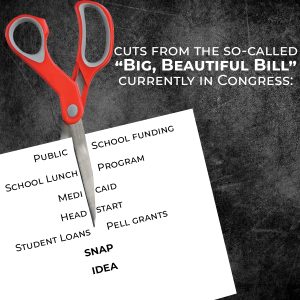
Volume 61, Issue 3
A Dangerous Deal: What the Republican Congress’ Reconciliation Bill Means for Kentucky’s Public Schools

On a razor-thin 215-214 vote, the U.S. House of Representatives passed what is being called one of the most damaging federal bills for working families, public education, and student welfare in recent memory. Officially titled the “Trump Reconciliation Bill,” H.R. 1 reads like a wish list of harmful policy changes—and its impact will be especially devastating here in Kentucky.
While the bill now heads to the Senate, educators and advocates across the Commonwealth should be on high alert: this bill threatens to dismantle core supports for Kentucky’s students, families, and public schools.
A Direct Assault on Public Schools
At the heart of H.R. 1 is a $20 billion tax credit voucher scheme that would redirect public dollars into private schools. Here’s how it works: Individuals and corporations can receive a dollar-for-dollar tax credit in exchange for donating money to intermediary organizations that fund private school tuition. Stock donations would earn even greater credits, encouraging wealthy donors to funnel even more money away from the public system.
This is no small, symbolic policy gesture. It is a large-scale public subsidy for private education—and Kentucky’s public schools, which educate more than 90% of the state’s children, will pay the price.
Even more troubling, the bill expands 529 education savings plans to include homeschool expenses, offering even more federal support for privately provided education that operates without the standards, accountability, or legal obligations of our public schools.
The Medicaid Crisis Hits Kentucky Hard
Kentucky is one of the most Medicaid-dependent states in the nation, with more than 1.5 million residents—including over 600,000 children—relying on the program for healthcare. This bill’s proposed $716 billion cut to Medicaid would have catastrophic consequences for Kentucky students and their families.
For many Kentucky schoolchildren, Medicaid is their only access point to essential services like speech therapy, mental health care, or vision screenings. School districts rely on Medicaid reimbursements to help fund in-school health services. Under this bill, those resources could disappear.
The legislation also accelerates the implementation of strict Medicaid work requirements, which are likely to result in millions losing coverage—especially those just above the poverty line. These are not abstract numbers; these are the families of the children sitting in Kentucky classrooms every day.
Hunger in the Cafeteria: The SNAP Cut Fallout
Also included in the bill is a $300 billion cut to the Supplemental Nutrition Assistance Program (SNAP), the cornerstone of America’s food security system. These cuts will disproportionately affect Kentucky families: nearly 1 in 6 households in the commonwealth rely on SNAP to afford groceries.
For schools, the consequences are immediate and dire. SNAP eligibility is one of the primary qualifiers for automatic enrollment in the National School Lunch Program. When families lose SNAP benefits, their children lose free or reduced-price lunches. The result? More hungry kids in Kentucky classrooms and more stress on their families to feed them.
Hidden Costs, Hollow Promises
While some elements of the bill are framed as “tax relief”—such as exemptions for overtime pay and car loan interest—the overall financial structure of H.R. 1 shifts massive costs onto states. Kentucky, already grappling with budget challenges in education and healthcare, will likely face impossible choices: either raise state taxes or slash essential programs.
The bill’s shift in administrative costs for SNAP (from 50% to 75%) and the requirement that states begin covering a portion of the benefits themselves is a particularly cruel twist. If Kentucky can’t meet these new financial demands, the result could be reduced benefits—or outright elimination of services—for thousands of families.
What Happens Next?
The Senate will soon begin crafting its own version of the bill and the final legislation will likely emerge from a conference committee, combining provisions from both chambers.
Educators across Kentucky—and the nation—should be prepared. The stakes couldn’t be higher. This is not just a budget debate in Washington. This is about whether Kentucky’s children will have access to health care, food, and high-quality public education. Stay tuned to KEA’s social media and watch for member action alerts for updates and calls for action!
The Bottom Line
This Reconciliation Bill is an attack on the public infrastructure that keeps Kentucky’s communities afloat. It is an attack on the government services on which many of us and the people we know and love rely. From rural school districts to inner-city neighborhoods, it jeopardizes the basic building blocks our students need to learn, grow, and succeed.
Educators must stay engaged, informed, and active. Whether it’s calling your senator, sharing your story, or joining KEA in organized advocacy, now is the time to speak up.
The future of public education in Kentucky—and the health and well-being of the students we serve—depends on it.
